HONG KONG (AP) — As the fifth anniversary of the China-imposed national security law approaches, Xia Baolong, a senior official overseeing Hong Kong affairs in Beijing, highlighted ongoing challenges facing the city. Speaking at a forum attended by Hong Kong's leader John Lee and other officials, Xia expressed concerns about persistent forms of soft resistance and the continued external intervention in Hong Kong's affairs. He emphasized that while the city has experienced a transition from chaos to order, the underlying threats remain present.
The national security law, implemented in response to the anti-government protests of 2019, has led to the prosecution of numerous pro-democracy activists. Among those targeted is Jimmy Lai, the founder of the now-defunct Apple Daily newspaper, who has faced charges under the law. The authorities' recent crackdown includes the recharging of young activist Joshua Wong, who is already serving a sentence related to a previous subversion case, and the raiding of six individuals' homes by national security authorities and the police, suspecting them of colluding with foreign forces.
Critics argue that these actions illustrate the diminishing Western-style civil liberties that were promised to remain intact during Hong Kong's return from British rule in 1997. Despite these criticisms, Xia defended the national security law, stating it specifically targets a very small group of individuals who severely threaten national security. He sought to reassure stakeholders that normal international exchanges are compatible with the national security law and should be protected under it.
In recent weeks, Hong Kong's authorities have intensified their crackdown on dissent, which critics interpret as a further erosion of freedoms. The law has had significant implications, leading to the disbandment of numerous civil society organizations and stifling political mobilization. During his speech, Xia reiterated the necessity of the law for maintaining stability and order in the city, while acknowledging the concerns associated with its enforcement.
This forum marked a significant moment in reflecting on the law's impact on Hong Kong, as officials attempt to project a narrative of stability amid ongoing tensions. The discussions also underline the complexities of navigating Hong Kong's relationship with both Beijing and the international community, as the city strives to maintain its global financial hub status while adhering to stringent national security measures. Xia's insistence on the law's targeted approach indicates the government's stance on governance and security in the region, further highlighting the ideological divide between Beijing and those advocating for greater freedoms in Hong Kong.












